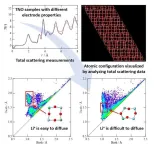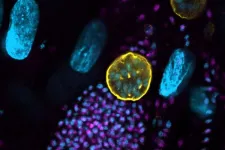(Press-News.org) MIAMI, FLORIDA (STRICTLY EMBARGOED UNTIL DEC. 9, 2024, AT 9 PM EST) – Smokers with myelodysplastic syndromes (MDS) or a precursor condition had elevated levels of genetic mutations linked to the disease, a new study shows. The study also found that heavier smokers accumulated more mutations, and long-term smokers were more likely to show disease progression.
Led by Sangeetha Venugopal, M.D., M.S., a physician-scientist at Sylvester Comprehensive Cancer Center, part of the University of Miami Miller School of Medicine, the study further suggests that quitting smoking may positively affect the course of disease, underscoring the importance of smoking cessation counseling.
“The message from this study should be to initiate tobacco cessation counseling in patients who carry a new diagnosis of MDS or its precursor conditions,” said Venugoapal, who is the study’s lead author and will present the findings at the American Society of Hematology (ASH) annual meeting, held Dec. 7-10 in San Diego.
Part of a Larger Study
Tobacco is highly addictive and is used by about 1.3 billion people worldwide, according to the World Health Organization. Tobacco smoking kills up to half of users who do not quit.
Tobacco-related lung cancers have been shown to be linked to the accumulation of DNA mutations caused by carcinogens in tobacco smoke. But little is known about the relationship between smoking and DNA damage in blood cancers.
To fill the gap, Venugopal and colleagues examined data from a larger research effort, the National MDS Natural History Study, sponsored by the National Heart, Lung, and Blood Institute (NHLBI) in collaboration with the National Cancer Institute (NCI). The study aims to create a comprehensive dataset of patient history along with linked collections of biospecimens, such as blood and bone marrow samples, in patients with recently diagnosed MDS or a precursor condition such as clonal cytopenia of undetermined significance (CCUS).
Researchers are tapping into the data to investigate molecular and biological factors associated with MDS to improve clinical management and potentially develop new treatments.
Mikkael Sekeres, M.D., M.S., chief of the Division of Hematology at Sylvester, chairs the five-year, multi-center MDS Natural History Study.
“Sylvester is a world leader in MDS research and patient care and is always investigating risk factors for developing cancer and interventions we can make to reduce our patients’ risk,” said Sekeres, who is also the corresponding author of the current analysis presented at the ASH meeting.
DNA Mutations, Disease Progression and Survival
The newly presented research involved 1,898 patients, 52% of whom had a history of smoking. The researchers assessed the number of mutations linked to MDS in the patients’ bone marrow samples using a panel of about 80 known mutations.
Smokers had, on average, more mutations than non-smokers in specific genes linked to disease (2.0 vs 1.4). The top 10% of heaviest smokers showed 3.5 times more mutations than non-smokers.
Long-term smokers with precursor conditions were also much more likely to progress to MDS within five years compared to non-smokers or people with a shorter smoking history (27% compared to 18%). Smokers with CCUS also had shorter overall survival than non-smokers.
The analysis provides much-needed data on the links between tobacco smoking, DNA mutations and disease risk in MDS, said Sekeres.
“While smoking is a recognized risk factor for developing blood cancers, this is the first study to identify discrete genetic mutations that are associated with smoking, to establish a dose-response relationship between smoking and genetic mutations (the more you smoke, the more mutations occur); and to show that continuing to smoke leads to more mutations and worse MDS. We should encourage patients to stop smoking after their diagnosis,” he said.
Smoking Cessation
The blood of smokers contains dozens of carcinogens, many of which damage DNA directly. Future areas of research include assessing the accumulation of mutations over time as patients progress from precursor disease to MDS.
Meanwhile, the new findings should change how physicians counsel patients who smoke, said Venugopal, who is also an assistant professor of hematology at the Miller School.
Patients with MDS or its precursor conditions sometimes wonder if quitting smoking is truly worth it since they already are ill, said Venugopal. The new data drive home the message that patients can benefit from tobacco cessation.
Some studies have suggested that quitting, even in the short term, might be beneficial for certain cancers, she said.
“Now we can show patients what happens when people continue to smoke,” said Venugopal. “I don't want them to blame the disease on their smoking, but I also don't want them to smoke.”
about Sylvester research on the InventUM Blog and follow @SylvesterCancer on X for the latest news on its research and care.
# # #
4597 Association between Smoking Intensity, Genetic Mutations, and Disease Progression in Myelodysplastic Syndromes
Monday, December 9, 2024: 6:00 PM-8:00 PM PST
Halls G-H (San Diego Convention Center)
# # #
(STRICTLY EMBARGOED UNTIL DEC. 9, 2024, AT 9 PM EST
END
Helical structures are ubiquitous across biology, from the double-stranded helix of DNA to how heart muscle cells spiral in a band. Inspired by this twisty ladder, researchers from Hiroshima University’s Graduate School of Advanced Science and Engineering have developed an artificial polymer that organizes itself into a controlled helix.
They published their results on Oct. 24 in Angewandte Chemie.
“Motivated by elegant biological helical structures, considerable effort has been devoted to developing artificial helical organizations with defined handedness ...
As the school year winds up, thousands of Aussie kids are looking forward to the summer holidays. But hand-in hand with this freedom comes an abundance of screentime, unhealthy snacks, and a lack of routine, and it has the potential to affect children’s physical and mental health.
In a new review of nearly 1500 participants University of South Australia researchers found that summer holiday programs, as offered through OHSC or sporting clubs, can help children stay engaged and active, helping offset the hours they spend in front of a screen.
UniSA PhD researcher and Fulbright Scholarship recipient Emily Eglitis says that summer programs ...
With rising greenhouse gas emissions, the urgency of addressing global warming and climate change has intensified, prompting a global shift towards renewable energy. The development of rechargeable batteries is essential for this effort. Lithium-ion batteries (LIBs) are one of the most widely used rechargeable batteries today, being used in cars, smartphones, and even for power storage. However, one major issue with LIBs is the risk of ignition. Commercial LIBs have a carbon-negative electrode with a low working potential. Since carbon operates near lithium metal deposition potential, there is a risk of internal short circuits, especially when the battery is quickly charged.
Alternative ...
ABSTRACTS: 216, 219, 1011
SAN DIEGO ― Three clinical trials led by researchers from The University of Texas MD Anderson Cancer Center demonstrated significant positive results from novel triplet therapies in the treatment of relapsed or refractory and newly diagnosed leukemias. The results were presented at the 66th American Society of Hematology (ASH) Annual Meeting and Exposition. More information on all ASH Annual Meeting content from MD Anderson can be found at MDAnderson.org/ASH.
Study demonstrates strong ...
INDIANAPOLIS — A study by Indiana University School of Medicine researchers sheds new light on how Toxoplasma gondii parasites make the proteins they need to enter a dormant stage that allows them to escape drug treatment. It was recently published with special distinction in the Journal of Biological Chemistry.
Toxoplasma gondii is a single-celled parasite that people catch from cat feces, unwashed produce or undercooked meat. The parasite has infected up to one-third of the world's population, and after causing mild illness, it persists by entering a dormant ...
The numbers of e-scooter and e-bike injuries have tripled in the US since 2019, fuelled by alcohol and substance use, finds a nationwide analysis of emergency department visits, published online in the journal Injury Prevention.
And the odds of alcohol and substance use were much higher among 10-17 year old riders with these injuries than they were among older age groups, the findings show.
E-scooters and e-bikes, collectively known as micromobility devices, have become increasingly popular, thanks to their zero emissions, amid higher fuel prices and better biking infrastructure, note the researchers.
Emerging evidence points to increasing numbers of injuries associated ...
Despite a fall in the number of people with asthma over the past decade who say that cost has stopped them taking their meds as prescribed, financial hardship still remains a deterrent for 1 in 6 with the condition, suggests research published online in the respiratory medicine journal Thorax.
Failure to stick to their drug treatment was associated with a near doubling in the risk of an asthma attack and a more than 60% heightened risk of an emergency department visit, the findings indicate.
The findings reinforce the importance of healthcare policy in promoting equitable access to drug treatment, concludes a linked editorial.
In 2021, the Centers for Disease Control ...
Psychedelic substances like psilocybin (found in magic mushrooms), MDMA (commonly known as ecstasy), LSD (commonly known as acid), and ayahuasca have shown potential in treating conditions such as depression, post-traumatic stress disorder (PTSD), and addiction. These substances can induce profound psychological experiences that, when paired with psychotherapy — a form of talk therapy — have been proposed to lead to significant therapeutic benefits.
Why Now?
Despite the growing interest and media coverage, no major regulatory agency has yet approved psychedelics for specific medical use. Access to these treatments remains limited to clinical ...
Removing 10 per cent of a patient’s blood before major liver surgery and giving it back afterwards reduced transfusions by half, according to a large clinical trial published in The Lancet Gastroenterology & Hepatology. Known as hypovolemic phlebotomy, this practice could save one in every 11 patients having this surgery from needing a transfusion.
“Blood loss is a major concern in liver surgery. Taking out half a litre of blood right before major liver surgery is the best thing we’ve found so far for reducing blood loss and transfusions,” said co-lead author Dr. Guillaume Martel, a surgeon and scientist who holds the Arnie Vered Family Chair in Hepato-Pancreato-Biliary ...
Despite a decade of global efforts, the world is far from reaching essential nutrition 2030 milestones set by the World Health Assembly, with critical gaps threatening the health of millions. According to a new Global Burden of Disease analysis, most countries are struggling to meet the six global nutrition targets set in 2012 to combat low birthweight, inadequate breastfeeding, child malnutrition, and anemia in reproductive-age women.
By 2021, limited success was seen with only a few countries meeting some of the targets: five countries achieved breastfeeding ...





